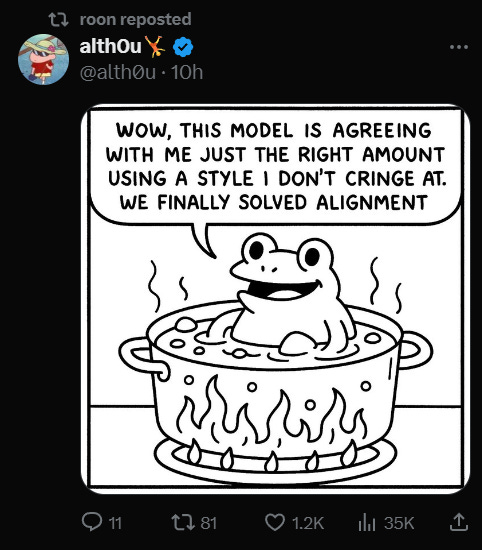Fact Checking won't get us out of our post-truth trouble
And therefore neither will AI, at least not if we keep going in the direction we are.
If fact checking could get us out of this mess, wouldn’t Wikipedia have solved it?
The issue isn’t that we lost “truth” as some platonic object out there. No one is debating how many hydrogen atoms a water molecule has.
The issue is sorting our opinions about facts.1 “Post-truth” and “fake news” mean flatland, pluralism, or as The Dude famously said in The Big Lebowski:
But since we have no principled way of sorting these opinions, we sort by engagement. And the most naive way to get engagement is controversy, which is good for platforms that sell engagement:
X won in the short run. Civilization lost.
The solution according to UpTrust is to recognize that some opinions are better than others, relative to a particular domain and context, and to constantly show and adjust this based on new information.2
Better how? More trustworthy.
More trustworthy to whom? Each individual, based on who their network of most trusted people most trust.
Then news, social media, review sites can systematically show you the most trusted and reasonable people from the “other side” of a debate, based on who you and your network trust, rather than showing you the most absurd and controversial.
And they can show you what the average trust is for a person, given a particular group’s point of view.
This is the same way trust works IRL—I generally trust different people for different things (cooking, politics, acting, physics, literature), different amounts, and I generally give the opinions of people I trust on a subject a lot more weight than thousands of people whose opinions I don’t trust. But I’m also aware of the general reputation of different people relative to the groups I’m exposed to.
This way allows us to aim for trustworthiness—a direction everyone agrees is a better direction than untrustworthy—while accounting for different preferences and cultures around what defines trustworthiness in any given situation.
We need a lot of help to get out of our current mess. So UpTrust also tracks and incentivizes “bridging” across ideological divides, again from a user-specific perspective. The system is agnostic to what the divides are; they’re based on user input. You can think of it like a much more sophisticated version of Community Notes—but more on that in another post.
If it wasn’t already clear from the above, this means the very premise of AI “fact checking” is doomed from the start. Solving the wrong problem won’t help us, because facts aren’t what’s at stake. Making sense of opinions about facts is. About which facts to choose. About what the facts mean and how they inform our policies.
Fact checking wants to make things certain, but most of what matters is uncertain. Do I get married? Do we get involved in a foreign war? Do we have a third kid? Sure we can train AI to operate to help us sort opinions probabilistically, in the way I’ve described above, but it’ll categorically never resolve irresolvable questions. And then there’s this issue:
We need a different epistemology; we need to sort opinions by better and worse according to a standard we all agree is good while allowing for difference, and we need that standard to be able to evolve as culture evolves.3
UpTrust suggests that we do this sorting through trust, the way we do it IRL.
The list of examples distinguishing facts and opinions about the facts are as endless as they are boring, eg:
Unresolved but will be a fact: Tariffs 2025 lead to more/less American manufacturing
Opinions: These are good/bad/wise decisions.
Unresolved but will be fact: The USA bombing Iran contributed to intensification/disarming Iran’s nuclear weapons program.
Opinions: Iran should have weapons. Trump should have gotten approval from Congress.
In the same way that perspectives on objective facts transcend and include the facts themselves, re-introducing a topography of trustworthiness must build upon subjectivity.
In Integral theory language, our orange world that seeks 3rd person objective facts has evolved to a green, 4th person pluralism that can recognize and appreciate infinite subjective perspectives on the facts, and UpTrust is evolving beyond this to take perspective on perspective on facts.
Despite the mess, our “green” cultural awareness of multiple points of view is an evolution in the complexity of our meaning-making. We grew up some and now we need to grow up more, not regress.









